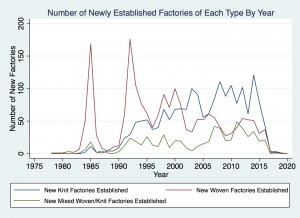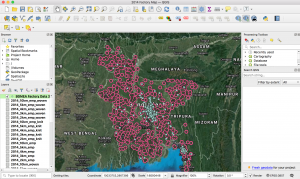Adam Abadi ’22 and Professor Gisella Kagy (Economics)
This summer, I worked with Professor Kagy to examine the impact of the Bangladeshi garment industry on women’s empowerment. The goal was to determine whether proximity to job opportunities at garment factories can empower married Bangladeshi women. To measure empowerment, we used survey responses about household decision-making power, presence of domestic violence, and investments in children’s education.
My work primarily focused on constructing a geographic dataset of Bangladeshi garment factories and synthesizing factory locations with survey data. Throughout the project, I used a combination of Python, Stata, and QGIS for webscraping, data analysis, and geolocating.
After doing a brief literature review, I wrote a Python script that webscraped data from an online directory of over 4,000 Bangladeshi garment factories. I then used Stata to clean the data and visualize its key characteristics.
Next, I used the Google Maps Geocoding API to identify a likely pair of latitude/longitude coordinates for each factory, using factory addresses as inputs, and cleaned the resulting dataset in Stata. I repeated this process with the Google Maps Places API, which instead takes the factory names as inputs. To evaluate the precision and probable accuracy of coordinates derived from these two geolocation methods, I analyzed metadata from each set of coordinates. After that, I synthesized the coordinates from each method that were most likely to be accurate.
Finally, I used QGIS to create another dataset that counted the number of employees and factories over time within a certain radius of each cluster of survey respondents. This will allow us to explore whether proximity to employment opportunities at garment factories affected respondents’ empowerment-related outcomes.


